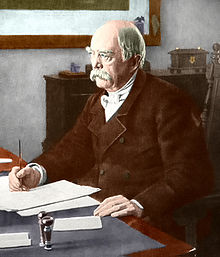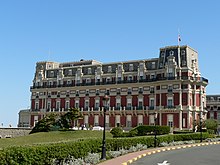
The history of Luxembourg consists of the history of the country of Luxembourg and its geographical area.

Napoleon III was the first president of France from 1848 to 1852, and the last monarch of France as Emperor of the French from 1852 until he was deposed in absentia on 4 September 1870.

The German Confederation was an association of 39 predominantly German-speaking sovereign states in Central Europe. It was created by the Congress of Vienna in 1815 as a replacement of the former Holy Roman Empire, which had been dissolved in 1806.
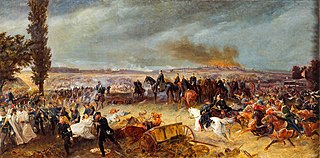
The Austro-Prussian War, also by many variant names such as Seven Weeks' War, German Civil War, Brothers War or Fraternal War, known in Germany as Deutscher Krieg, Deutscher Bruderkrieg and by a variety of other names, was fought in 1866 between the Austrian Empire and the Kingdom of Prussia, with each also being aided by various allies within the German Confederation. Prussia had also allied with the Kingdom of Italy, linking this conflict to the Third Independence War of Italian unification. The Austro-Prussian War was part of the wider rivalry between Austria and Prussia, and resulted in Prussian dominance over the German states.
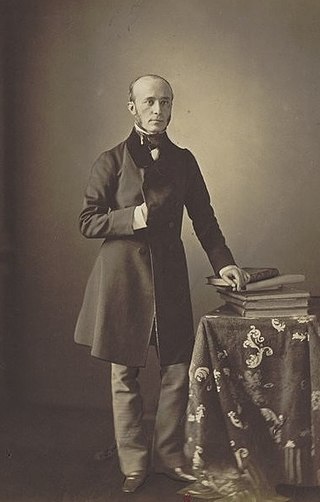
Vincent, Count Benedetti was a French diplomat. He is probably best known as one of the central figures in the instigation of the Franco-Prussian War through his role in the Ems Dispatch.

The Ems Dispatch, sometimes called the Ems Telegram, was published on 13 July 1870; it incited the Second French Empire to declare war on the Kingdom of Prussia on 19 July 1870, starting the Franco-Prussian War. The actual dispatch was an internal telegram sent by Heinrich Abeken from Prussian King Wilhelm I's vacationing site at Ems to Otto von Bismarck in Berlin, describing demands made by the French ambassador concerning the Spanish succession. Bismarck, the chancellor of the North German Confederation, released a statement to the press, stirring up emotions in both France and Germany.
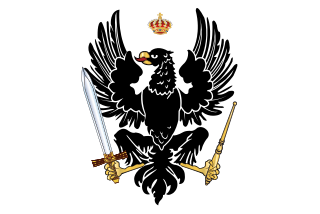
The Kingdom of Prussia constituted the German state of Prussia between 1701 and 1918. It was the driving force behind the unification of Germany in 1866 and was the leading state of the German Empire until its dissolution in 1918. Although it took its name from the region called Prussia, it was based in the Margraviate of Brandenburg. Its capital was Berlin.

The North German Confederation was initially a German military alliance established in August 1866 under the leadership of the Kingdom of Prussia, which was transformed in the subsequent year into a confederated state that existed from July 1867 to December 1870. A milestone of the German Unification, it was the earliest continual legal predecessor of the modern German nation-state known today as the Federal Republic of Germany.

The Zollverein, or German Customs Union, was a coalition of German states formed to manage tariffs and economic policies within their territories. Organized by the 1833 Zollverein treaties, it formally started on 1 January 1834. However, its foundations had been in development from 1818 with the creation of a variety of custom unions among the German states. By 1866, the Zollverein included most of the German states. The Zollverein was not part of the German Confederation (1815-1866).

Count Friedrich Ferdinand von Beust was a German and Austrian statesman. As an opponent of Otto von Bismarck, he attempted to conclude a common policy of the German middle states between Austria and Prussia.
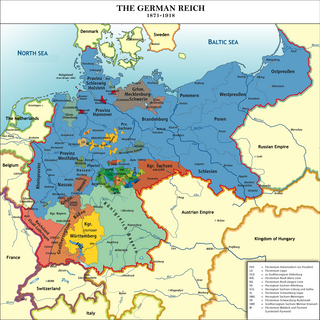
The unification of Germany was a process of building the first nation-state for Germans with federal features based on the concept of Lesser Germany. It commenced on 18 August 1866 with adoption of the North German Confederation Treaty establishing the North German Confederation, initially a military alliance de facto dominated by Prussia which was subsequently deepened through adoption of the North German Constitution. The process symbolically concluded when most of south German states joined the North German Confederation with the ceremonial proclamation of the German Empire i.e. the German Reich having 25 member states and led by the Kingdom of Prussia of Hohenzollerns on 18 January 1871; the event was later celebrated as the customary date of the German Empire's foundation, although the legally meaningful events relevant to the accomplishment of unification occurred on 1 January 1871 and 4 May 1871.

The Gastein Convention, also called the Convention of Badgastein, was a treaty signed at Bad Gastein in Austria on 14 August 1865. It embodied agreements between the two principal powers of the German Confederation, Prussia and Austria, over the governing of the 'Elbe Duchies' of Schleswig, Holstein and Saxe-Lauenburg.

The Kingdom of Bavaria was a German state that succeeded the former Electorate of Bavaria in 1806 and continued to exist until 1918. With the unification of Germany into the German Empire in 1871, the kingdom became a federated state of the new empire and was second in size, power, and wealth only to the leading state, the Kingdom of Prussia.
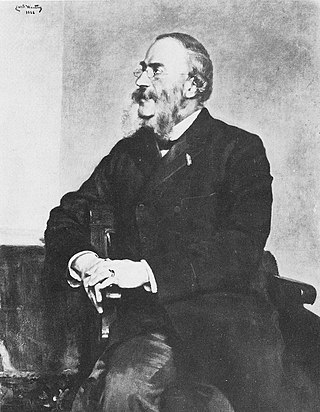
Gerson von Bleichröder was a Jewish German banker.

The Treaty of London, often called the Second Treaty of London after the 1839 Treaty, granted Luxembourg full independence and neutrality. It was signed on 11 May 1867 in the aftermath of the Austro-Prussian War and the Luxembourg Crisis. It had wide-reaching consequences for Luxembourg and for relations among Europe's great powers.

There were three Partitions of Luxembourg between 1659 and 1839. Together, the three partitions reduced the territory of the Duchy of Luxembourg from 10,700 km2 (4,100 sq mi) to the present-day area of 2,586 km2 (998 sq mi) over a period of 240 years. The remainder forms parts of modern-day Belgium, France, and Germany.

The causes of the Franco-Prussian War are deeply rooted in the events surrounding German unification. In the aftermath of the Austro-Prussian War (1866), Prussia had annexed numerous ethnically German territories and formed the North German Confederation with other German territories. Prussia then turned its attention towards the south of Germany, where it sought to expand its influence.
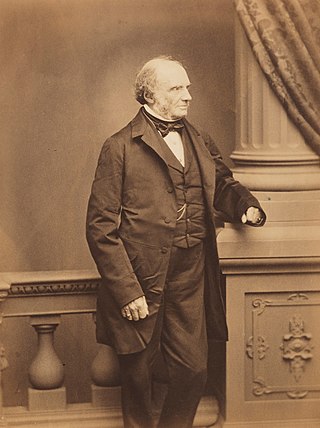
The London conference of 1864 was a peace conference on the Second Schleswig War that took place in London from 25 April to 25 June 1864.

The Tornaco Ministry was in office in Luxembourg from 26 September 1860 until 3 December 1867. It was reshuffled six times.
The Belgian Railway Crisis was a Franco-Belgian conflict in 1868/1869. A French railway company, the Compagnie des chemins de fer de l'Est, wanted to take over two railway lines in eastern Belgium. The Belgian government suspected that the French imperial government wanted to acquire indirect influence in Belgium, so it prevented the project.
